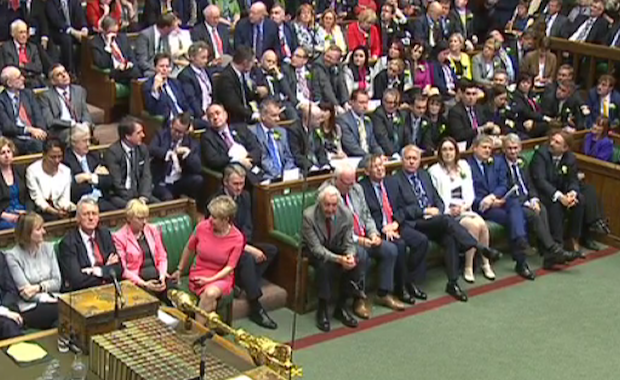The SNP have done a rather good job this afternoon of uniting the rest of the Commons against them by indulging in the shameful practice of – brace yourself – clapping in the Chamber. This is on top of trying to turf Dennis Skinner out of his preferred seat to the extent that the octogenarian Labour MP was too upset to come up with a terrible joke to crack during the Queen’s Speech festivities in the Commons. This truly is the sort of dramatic shake-up of Westminster that we were promised.
Speaker Bercow intervened after one particularly pointed bout of applause from the nationalist benches. He told them to respect the traditions of the House of Commons, and that he would ensure they had their opportunities to make speeches and ask questions.
Clapping isn’t banned in the Commons, but it is traditionally something members do not do. This is what the select committee on the modernisation of the House of Commons had to say about applause in 1998:
‘The current rules in relation to silence, which are more often honoured in the breach than in the observance, are described on page 391 of Erskine May: “Members must not disturb a Member who is speaking by hissing, chanting, clapping, booing, exclamations or other interruption”. By contrast, “when not uttered till the end of a sentence, the cry of ‘hear, hear,’ offers no interruption of the speech”. Several new Members, while accepting that interruptions of the sort described are not permissible, have indicated that they find it incomprehensible that it is not in order to clap at the end of a speech, a practice which is commonplace in other gatherings and indeed in other Parliaments.
‘While we agree that spontaneous clapping at the end of a speech could in no way be interpreted as disturbance of the speaker, there is a danger that such a practice might be open to abuse and could lead in certain circumstances to orchestration of what would amount to standing ovations with the success or failure of a speech being judged not by its content but by the relative length of the ovation at the end. This might not disrupt an individual speech, but would disrupt the tenor of the debate, as indeed would slow handclapping. At the same time we condemn the growing misuse of the traditional cry of “hear, hear” and in particular the recent practice of unnecessary noise of this kind from both sides which has routinely accompanied the entrance of the Prime Minister and Leader of the Opposition before Prime Minister’s Questions. Such noise serves no useful purpose and is grossly unfair to the Member who is currently trying to ask a question and to the Minister who is replying.’
Anyone who has been to party conferences and watched the tedious standing ovations from party activists who may even be about to ditch their leader (e.g. Iain Duncan Smith’s ‘turning up the volume’ speech) will know that clapping and ovations rarely add much to politics.
But then again, anyone who has sat in the Chamber for any length of time may feel it is a tad hypocritical that Tories and Labour MPs have been huffing and puffing at all about a certain sort of noise in the Chamber. After all, both parties are capable of producing a great deal of unedifying noise. Both have organised heckling squads set up for PMQs. Perhaps Labour will be a little quieter now Ed Balls is not on the front bench, heckling and gesticulating wildly.
Clapping may be one way of drowning out a speaker, but roaring, shouting ‘weak!’ repeatedly to throw a speaker off balance, and generally trying to shut down a debate with noise (as opposed to skilful sledging across the Commons, which has a role in the wit and hurly burly of the Chamber – trying to drown someone out does not) is no less worthy of fury and rebuke than the practice of clapping.
But while the SNP might be enjoying their status as rebel clappers, they must know that at some point they will have to work out a way of shaking up Westminster in a more dramatic fashion than simply by doing something a bit naughty in the Chamber, like children trying to disrupt a school assembly. And at that point, they may find that the Speaker who has rebuked them today comes in rather handy, given he is a man minded to turbocharge backbenchers and empower the Commons.
You might also enjoy: Tory MP teaches SNP MPs Westminster etiquette








Comments